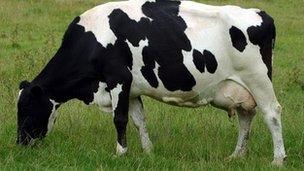Dairy Crest sales rise 15% in 'challenging' market
- Published

Dairy Crest is cutting the amount it pays farmers for a litre of milk
Dairy Crest, one of the UK's largest dairy processors, has reported total sales up 15% in the first quarter.
The company, which owns the Clover and Cathedral City brands, has trying to increase its profitability and is in the process of selling two dairies to reduce capacity.
From 1 August, Dairy Crest will pay farmers 1.65p less for a litre of milk.
The company made a net loss of £10.1m for the year to 31 March, against a profit of £77.8m a year ago.
"Dairy Crest's overall trading in the first quarter has been challenging, especially in our dairies business", said <link> <caption>chairman Anthony Fry in a statement</caption> <altText>link to Dairy Crest statement</altText> <url href="http://www.dairycrest.co.uk/press-media/news/agm-and-interim-management-statement/" platform="highweb"/> </link> .
"However, we have taken decisive steps to return it to satisfactory level of profitability."
Mr Fry blamed the necessity for milk purchase cuts on "lower returns from commodity cream markets".
He accepted that these cuts had "put pressure on our supplying farmers", but said the company was "working with them on plans to reduce the impact of these cuts".
Total sales of its four UK brands - Cathedral City, Country life, Clover and Frijj - have risen 15% in the first quarter, compared with the same period last year.
Dairy Crest said the imminent sale of its French spreads business St Hubert for £344m would "substantially reduce" its net debt.
The disposal forms part of a strategy to refocus on the UK.
Mr Fry also said the company was "on track" to meet its £20m efficiency savings target.
Dairy protest
On Tuesday afternoon, MPs on the Environment, Food and Rural Affairs Committee took evidence on milk prices in response to the latest price cuts.
Mike Sheldon, milk procurement director at Dairy Crest, argued that milk prices were a supply chain issue, with volatile commodity markets increasing the cost of feed for cows and supermarkets driving hard bargains with their suppliers.
"We, as processors, are seeing our margins squeezed in the middle of this supply chain", he said.
Last Wednesday, about 2,000 dairy farmers gathered in London to protest at the latest cuts by processors of up to 2p a litre.
Agriculture Minister Jim Paice said the average price of a pint was 49p, of which 16p went to farmers, and the price cuts were "a massive burden for the vast majority of dairy farmers".
Four leading dairy processors have announced cuts in the price they will pay for a litre of milk from August, the second price cut in as many months.
Robert Wiseman Dairies and First Milk have both cut the pence per litre (ppl) price by 1.7; Arla Foods UK by 2.0ppl and Dairy Crest by 1.65ppl.
The National Farmers Union says the cuts will affect 27% of producers and impact on 25% of the milk market volume.
But the cuts will not affect farmers supplying Tesco, Sainsbury's, Marks & Spencer or Waitrose, as they are paid directly by the supermarkets.
Milk delivered to the doorstep costs consumers about 65p a pint.
- Published11 July 2012
- Published6 July 2012
- Published29 June 2012
- Published24 May 2012
- Published28 April 2012